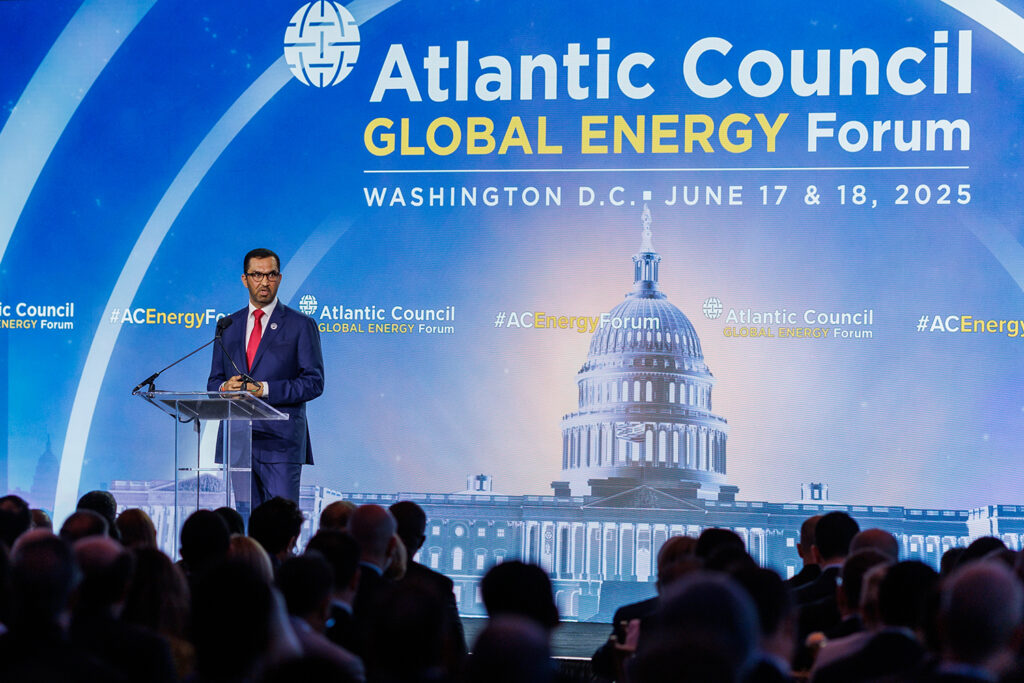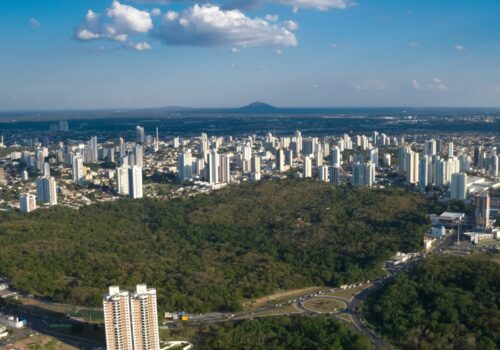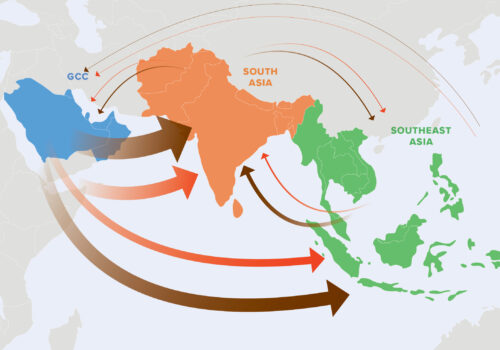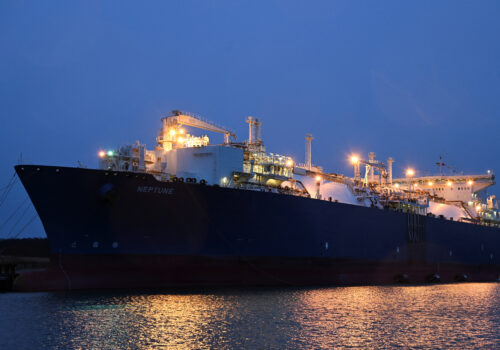Watch the Global Energy Forum
Event transcript
Uncorrected transcript: Check against delivery
SULTAN AL JABER: Good morning, everyone. It is indeed a great pleasure to be back here in Washington, DC. And it’s a real pleasure to see so many friends, colleagues, and partners at this very important forum.
Let me begin by thanking my dear friend and partner Fred Kempe for his commitment, and his guidance, and his support throughout the years. And allow me also to thank his team for working very closely with us and for hosting this very important and relevant forum. With your focus on energy security, economic competitiveness, and global prosperity, this forum could not be more on point.
Colleagues, before I continue allow me to address the evolving situation in our part of the world. The United Arab Emirates stands for dialogue, for de-escalation, and diplomacy. We call on all parties to show restraint. And we reaffirm our belief in peace over provocation, calm over confrontation, and progress through partnership, and only partnership.
Colleagues, moments like these remind us that energy is not just the engine of progress. It is a cornerstone of peace, stability, and ensuring prosperity. And as we say—or, as we stay committed to dialogue and diplomacy, we must also stay focused on the opportunities that lie ahead. Because while the world seeks calm, a new chapter in human progress is being written. And this chapter is defined by two simple truths. The first is that artificial intelligence is driving the next stage of evolution. And the second is that AI is driven by energy. In short, AI supremacy is essentially an energy play.
And the race for AI is not just about code. In fact, it’s about gigawatts. Every advance in AI uses more energy. A single ChatGPT query uses ten times the energy of Google search. AI generated video, one hundred times more. And we are now entering the era of the one gigawatt hyperscaler, where a single datacenter consumes as much electricity as a city of the size of Pittsburgh. And over the next five years, the US alone will need anywhere between 50 and 150 gigawatts of new installed capacity.
And meeting this demand is not just a technical challenge. It is a once-in-a-generation investment opportunity. In fact, it is an opportunity that will require a system-wide shift, with energy, technology, finance, and policy all operating in sync. That’s why yesterday, and here in Washington, DC, and in partnership with The Atlantic Council and MGX, we brought together leaders from all these relevant sectors to the second ENACT forum. And we do this in an effort to answer the fundamental and pressing questions, and to help build an integrated roadmap for a systemwide action.
Our first recommendation may seem obvious, but in my view, it is very urgent: In the age of hyperscalers, we must hyperscale energy. That means reliable baseload like gas, renewables backed by storage, breakthroughs from [small modular reactors] to fusion, and perhaps most critically a pragmatic pause on early retirements of existing power plants while we bring back nuclear to be part of mainstream energy mix.
Power generation is only half of the story, though. Getting the power to the end user is the other half. And in fact, it’s the most—it’s the more complex part of that equation. The fact is, you can’t run tomorrow’s technology on yesterday’s grid. And many—and that’s a fact—many of our grids were built for a completely different century and a completely different circumstance.
Wait times for key components like transformers and turbines can take more than three years to make them available. And this is not just a supply chain problem; it is a bottleneck to industrial growth, and that’s how we should view it. It is a bottleneck to economic prosperity and to industrial growth.
And solving it will require an investment surge of up to 300 billion US dollars annually in the US alone. We must de-risk major capital investments, and here policy can and must help. Policy cannot hold up progress. And we must take the gridlock out of the grid.
Currently, there are about 2,600 gigawatts of planned capacity around the world waiting for a proper grid connection. We must fast-track permitting and unlock that great potential. Let us train the one million electricians needed for a twenty-first-century power system. And let’s not forget that AI can unlock its own energy challenge by managing peaks and dips in demand, optimizing grid flows, and supercharging operational efficiency.
Friends, colleagues, and partners, the opportunity ahead is massive, but the window to act is very narrow. And the key to success is cooperation and true partnership. That is why the UAE is wasting no time in taking our powerhouse energy partnership with the US to the next level.
Over the next ten years we plan to grow our US energy investments sixfold, from the existing 70 billion US dollars to 440 billion US dollars. And we will do this through XRG, our international energy investment company. We are an anchor investor already in the largest LNG plant here, in Texas, and we produce specialty chemicals across the United States of America through Covestro and Nova Chemicals. And through Masdar, we have developed 5.5 gigawatts of renewable energy and storage capacity from coast to coast, and we are just getting started.
And to help harness our ambition, we just opened and activated our XRG-Masdar offices here in Washington, DC. Because, for us, the United States is not just a priority; it is more of an investment imperative. This is not just capital. It’s conviction in a shared future.
Partners, colleagues, and friends, to realize the full power of AI we must give it the power it needs. And this starts with a coordinated roadmap, a holistic approach, a comprehensive, cohesive roadmap that can be applied locally and scaled globally. We need policy that clears the path, infrastructure that carries the load, and investment that meets the moment. AI and energy are the twin engines of human progress—two engines, one direction, fast-forward into the future. And I’m here to invite you all to help shape that future together. I thank you.
Watch the full event
Further reading
Mon, Jun 16, 2025
Scaling up private capital for climate investment in emerging markets
Issue Brief By Amin Mohseni-Cheraghlou, Frank Willey
The gap between actual and needed global investment in renewable energy is projected to grow to tens of trillions of dollars over the next ten to thirty years.
Thu, Jun 12, 2025
Energy strategy across the Arabian Sea and Indian Ocean
Issue Brief By Phillip Cornell
The energy landscape of the ASIO region is also a key component of broader, global geopolitical and strategic change.
Thu, Feb 20, 2025
The 2025 Global Energy Agenda
Global Energy Agenda By
The Atlantic Council is pleased to present its fifth Global Energy Agenda. As in prior years, this collection of essays is complemented by our in-depth analysis of the results of the Atlantic Council Global Energy Center’s annual global energy survey.
Image: Sultan Al Jaber speaks at the Atlantic Council's Global Energy Forum on June 17, 2025 in Washington, DC.



